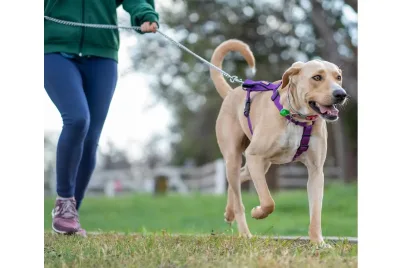Dog Bad Breath SOS: Causes, Treatments, & Prevention
Ever found yourself hesitating to embrace your doggie due to an unwelcome odor? Dog bad breath is a common canine woe that can hint at underlying health issues. The scenario of a dog with bad breath attempting a friendly lick can be disheartening.
Ensuring the well-being of our furry companions tops the list of priorities for any dog parent. Amid the myriad aspects of canine health, dental care often slips under the radar. Maintaining my furry friend’s overall health is a constant endeavor. Among the key contributors is dental care—a vital yet overlooked component.
As we embark on the New Year, let’s consider an actionable resolution for our cherished pets of a commitment to enhancing our dog’s oral health. Many dog parents have faced the challenge of foul-smelling dog breath and sought remedies. Let’s delve into the reasons behind dog bad breath and explore effective ways to treat or prevent this not-so-pleasant phenomenon.
The Silent Issue: Dog Bad Breath
Recognizing signs of bad breath is crucial for any dog parent. Unpleasant odors may signal underlying dental problems. Understanding the root causes, from poor oral hygiene to potential health issues, is the first step in addressing dog bad breath.
Don’t ignore foul-smelling breath; it could indicate serious health conditions like kidney or liver disease. Your attention matters for their health.
From merely troubling pet parents, dog bad breath has evolved into a veterinarian’s diagnostic ally, uncovering, and identifying specific health issues. Here are some prevalent issues:
Tackling Dental or Gum Disease
The leading culprit behind dog bad breath is often periodontal disease.
The American Animal Hospital Association reports “By three years of age, most dogs and cats have some level of periodontal disease. Not always apparent to pet owners, periodontal disease can cause oral pain, infection, inflammation, and other health problems, decreasing the quality of life for these pets.”
Dogs with misaligned or crowded teeth face a higher risk, but most dogs encounter tartar or plaque buildup at some point. Dental disease arises from bacterial overgrowth, forming plaque that progresses to tartar, causing gingivitis and, eventually, bad breath.
Oral health problems, from tooth decay to gum disease, contribute to the notorious “dog breath.” Regardless of the specific issue, bacteria and debris accumulate over time, fostering plaque and persistent odor. While a slightly off aroma may signal emerging issues, unchecked problems lead to stronger smells and declining oral health.
Kidney Issues
The kidneys serve as the body’s filtration system, but when they fail, toxins like urea accumulate, leading to distinctive odors. If your dog’s breath resembles ammonia or urine, it might signal kidney issues, and excessive urea can even cause mouth ulceration.
A peculiar scent, akin to feces or urine, in your pup’s bad breath could indicate various concerns, from dietary habits to potential kidney problems. When a dog’s kidneys struggle to filter toxins, the resulting buildup not only affects their breath but poses serious health risks.
While a dog munching on feces might explain poop-like breath, a urine-like odor is a red flag for kidney disease. Such symptoms warrant a prompt veterinary visit as kidney issues are serious and may indicate broader health problems.
Liver Disease
When your dog’s breath turns foul, especially accompanied by jaundice, weight loss, poor appetite, and vomiting, it could indicate liver issues. Just like the kidneys, the liver filters toxins, and liver dysfunction can manifest as bad breath due to toxin buildup.
If your furry friend’s breath takes a turn for the worse, coupled with symptoms like vomiting, poor appetite, and jaundice, it might signify liver disease. The scent, along with these signs, could point to a serious condition, necessitating urgent veterinary attention.
A truly unpleasant breath, combined with vomiting, loss of appetite, and yellow gums, may signal a liver problem. Similar to kidney disease, liver issues are potential indicators of severe conditions, urging prompt veterinary intervention for your dog’s well-being.
Diabetes
When diabetes is unregulated, it triggers fat breakdown, producing ketones, giving your dog’s breath a sweet or acetone scent. This distinctive odor, along with symptoms like weight loss and increased thirst, signals potential diabetes. If your dog’s breath has a sweet or fruity smell, it’s crucial to consult your vet promptly.
Is your dog’s breath oddly sweet or fruity? A sweet or fruity aroma in your dog’s breath could indicate diabetes, a treatable but serious condition. Seek advice from your vet and check for other symptoms like increased thirst and urination.
Eating Toxic Items
When dogs consume certain toxins or plants, their breath might emit a rancid or rotting smell. Identifying potential exposures aids in tailored treatment for your pet. Dogs ingesting cigarettes may have breath carrying a distinctive nicotine odor, highlighting the importance of recognizing specific toxins.
If your puppy’s breath smells like feces, it might be due to curiosity about litter boxes or consuming feces. Dogs eating non-food items, such as household objects or toys, can develop rotten-smelling, dog bad breath. Recognizing these behaviors helps in addressing potential issues promptly.
Ever wondered why your dog’s breath smells strange? Dogs exploring the environment may ingest toxins or household items, causing unique odors. Understanding these incidents guides proper care for your furry friend.
Oral Tumors
As our furry companions age, the likelihood of developing oral tumors increases, often resulting in unpleasant breath. Oral cancers can cause infections and tissue necrosis, persistently causing dog bad breath even with proper dental care. The most prevalent oral tumors in dogs include melanoma, squamous cell carcinoma, and peripheral odontogenic fibromas. Understanding these conditions is crucial for timely intervention and comprehensive care for your beloved doggie.
Dietary Imbalances and Deficiencies
Ensuring your dog’s nutritional needs are met is key to preventing not just dog bad breath but fostering their overall well-being. While homemade meals can be beneficial, understanding the nuances of canine nutrition is crucial. Professional advice can guide you in creating a diet that not only suits your dog’s taste buds but also promotes a healthy bacterial balance, keeping bad breath at bay. Your furry friend deserves a diet that’s both delicious and nutritionally sound.
Embarking on a raw or home-cooked diet for your dog is a commendable effort, but it’s essential to navigate potential pitfalls. Such diets may alter the bacterial balance in the mouth or gut, potentially leading to dog bad breath. The increased risk of Salmonella overgrowth is a concern, emphasizing the need for expert guidance. Consulting a veterinary nutritionist or your regular vet can help tailor a well-balanced diet, addressing dietary deficiencies and promoting optimal oral and overall health for your canine companion.
Dog Health Impact
Ensuring a dog’s overall health involves more than just addressing dog bad breath; it’s about understanding the broader impact of dental issues. Beyond the discomfort, untreated problems like periodontal disease can lead to pain and affect a dog’s behavior and eating habits. The repercussions extend further as bacteria from oral issues can enter the bloodstream, potentially impacting vital organs.
Research solidifies the link between oral health and systemic well-being in dogs. Dental problems don’t just stop at the mouth; they can contribute to serious issues in the heart, liver, and kidneys. Regular dental care goes beyond maintaining fresh breath; it plays a pivotal role in ensuring a longer, healthier life for your beloved canine companion. Prioritizing oral health is an integral part of comprehensive dog care.
Your dog’s well-being hinges on addressing dental concerns for more than cosmetic reasons. The impact is profound, from preventing pain and behavior changes to averting potential systemic health issues. By recognizing the significance of oral health, you’re not just ensuring fresh breath; you’re actively contributing to the overall longevity and vitality of your furry friend.
Preventing and Treating Dog Bad Breath
We all love our furry friends, but dealing with dog bad breath can be challenging. However, understanding how to tackle this issue is crucial. Treatment options vary based on the underlying cause. For plaque and periodontal disease, a vet’s dental cleaning might be the key, addressing loose or damaged teeth if necessary. Unsupervised snacking can lead to foul breath, so securing the trash and limiting access to unpleasant outdoor finds helps.
Medical conditions like diabetes, kidney, or liver disease require professional veterinary treatment. Once the root cause is addressed, dog bad breath should improve. Regular dental exams play a vital role in early detection, preventing dental disease and other health issues. From routine brushing to dental treats, products, and special diets, several strategies enhance oral health. Proactive measures include: regular veterinary check-ups and choosing the right doggie dental products. This can contribute significantly to preventing and treating dog bad breath.
3 Ways to Combat Dog Bad Breath
Consistent Brushing:
Engaging in a routine of brushing your dog’s teeth, whether on a weekly or daily basis, using specially formulated toothpaste and brushes designed for canines, proves highly effective in averting the formation of plaque. Numerous dog toothpaste options come in enticing flavors to make the brushing experience appealing for your furry friend.
Dog Dental Treats & Dental Products:
Treats designed for dental health serve the dual purpose of physically eliminating plaque during your dog’s chewing activity and often include additives supporting a wholesome oral environment. Additionally, there are alternative products such as dental water additives that not only contribute to freshening breath but also promote overall oral well-being. Typically devoid of flavors, you can easily incorporate a small quantity of these additives into your pet’s water dish on a daily basis.
Canine Oral Nutrition:
Specially formulated diets for dogs aim to minimize plaque accumulation by employing larger kibble sizes and a textured composition that aids in scraping along the teeth during chewing, effectively removing plaque.
Conclusion
In the journey of caring for our beloved dogs, prioritizing oral health emerges as a crucial aspect often overlooked. Dog bad breath is not merely a cosmetic concern; it can signify underlying health issues that demand attention. Understanding the various causes, from dental problems to systemic health issues, is the first step toward comprehensive care for our furry companions. From tackling dental diseases to addressing specific health conditions, proactive measures contribute not only to fresher breath but also to the overall well-being and longevity of our cherished pets.
FAQs:
Q1: Why is dog bad breath more than just a cosmetic problem?
A: Bad breath in dogs can signal underlying health issues, from dental problems to serious conditions like kidney or liver disease.
Q2: What are the potential causes of dog bad breath – beyond dental issues?
A: Dog bad breath can result from various factors, including kidney problems, liver disease, diabetes, dietary imbalances, ingestion of toxic items, and oral tumors.
Q3: Can bad breath in dogs be an indicator of systemic health problems?
A: Yes, bad breath in dogs can be a sign of systemic health issues, as bacteria from oral problems can enter the bloodstream and impact vital organs.
Q4: How can I prevent and treat dog bad breath?
A: Prevention involves regular dental care, including brushing, dental treats, and choosing the right diet. Treatment depends on the underlying cause and may include veterinary intervention.
Q5: What role does oral health play in a dog’s overall well-being?
A: Oral health is integral to a dog’s overall health. Untreated dental issues can lead to pain, behavior changes, and contribute to systemic problems in the heart, liver, and kidneys.




